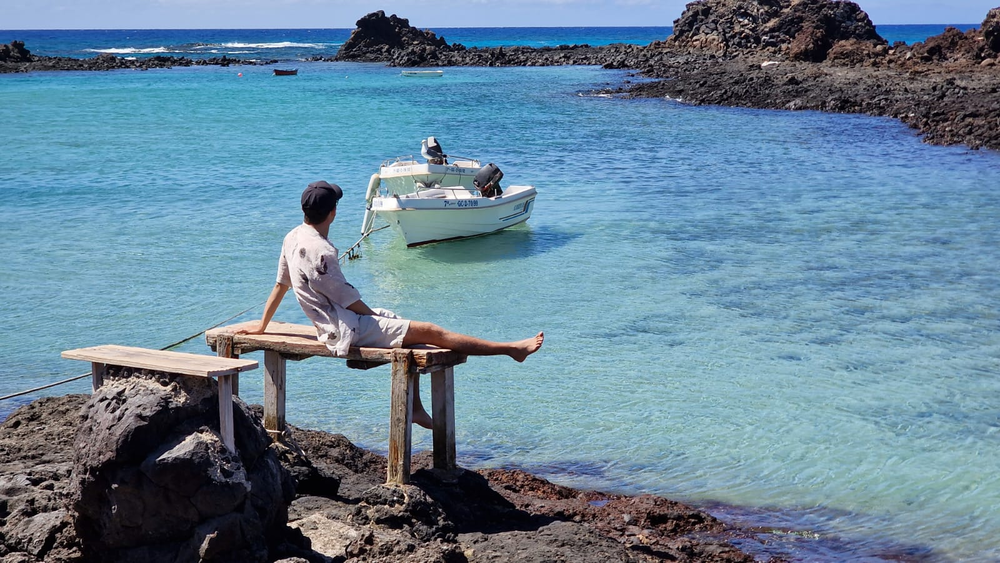Erasmus student reports on his semester abroad in Gran Canaria

"Living and studying in a place where others spend their summer vacation? That's possible?" - That was pretty much my reaction when I found out that the HSZG had a partner university in Gran Canaria. I had been considering the idea of a semester abroad for a while and was sure that I wanted to have such an experience. The only question that remained was: where should I go?
After intensive discussions with the International Office about possible destinations, it quickly became clear to me: I wanted to go to a country with a vibrant and lively culture. "That would be just the thing, barely a year after a global pandemic," I thought. So the idea of going to Las Palmas de Gran Canaria in Spain was a perfect fit.
While preparing for my study visit, I quickly realized that everything in Spain is a little more leisurely than in perfectly organized Germany. For example, the module catalog and the official start of the semester are only announced 4 to 6 weeks before the start. Anyone planning a stay in Spain should therefore be patient and not expect everything to be arranged in advance.
I had already started learning Spanish a few months beforehand in order to find my way around the country better. However, when I found out that practically all courses at my faculty were held exclusively in Spanish, I was a little intimidated at first.
Looking back, you shouldn't let such challenges put you off too much. In Germany, you're used to being able to plan a lot of things well in advance. In Spain, on the other hand, you quickly learn that you shouldn't stress yourself out and can trust that you will find a suitable solution on the spot. Many of my initial worries were resolved in the first few weeks after I sought direct contact with the professors and those responsible.
My fellow Erasmus students and I had very different language skills, but we received a lot of support and help as soon as we asked for it. We also took a language course at the university together and studied together to some extent, which ultimately enabled us to take the exams entirely in Spanish - albeit with somewhat bumpy Spanish.
Finding accommodation was surprisingly straightforward. There was a large WhatsApp community in which numerous landlords offered accommodation for Erasmus students. Most of my fellow students simply booked a hostel for the first two weeks and then took their time looking at different student rooms on site to choose the best one for them.
Life on Gran Canaria is generally very relaxed. Away from the tourist hotspots, there is a noticeable slowdown and serenity. At the same time, you can experience the Spanish joie de vivre, especially in the evening, when people gather in parks and on the terraces of small restaurants. In Las Palmas, the city remains lively even at night and impresses with its cultural diversity. There is always something to discover or do.
A particular highlight is the carnival, which is one of the biggest and most colorful festivals on the island. During this time, the entire city is transformed into a huge party zone. For weeks, parades, colorful costume parties and open-air concerts take place all over the city. It was amazing to me how many people (even locals) participate fully in the events. Almost everyone joins in the celebrations and dresses up in all shapes and colors. You should definitely take part in the big Las Palmas carnival parade in particular, it's a truly unique experience.
At the beginning of my semester abroad, around 240 other Erasmus students started their stay at ULPGC with me. I got to know many of them at the introductory event, which made it easy to make contacts and friends quickly.
I would particularly like to highlight the student organization in Las Palmas (ESN Las Palmas), which organized numerous events and weekend trips. All you had to do was attend one of the many events and you would always meet lots of open-minded people. Thanks to the really great work of the student organization, a large and well-connected social network quickly developed among the students and there were many joint activities. One of the well-known bars quickly developed into a kind of "regular pub" where you always met other Erasmus students.
After getting together with many like-minded people, it was great to explore the island and have a lot of fun. Whether surfing, hiking, diving, playing volleyball or just lying on the beach - there's something for everyone here.
Those who wanted to get a taste of something different had the opportunity to join an organized trip to one of the neighbouring islands. There were even two trips to Morocco, where you could ride camels and spend a night in the Sahara. My friends and I organized ourselves in small groups, especially towards the end of the semester, to explore one or two of the neighbouring islands on our own, such as Fuerteventura, Tenerife or Lanzarote.
In conclusion, I can say that my Erasmus semester was one of the best experiences of my life. I am very grateful for the many great experiences, the friends I made and the opportunity to have had such an experience abroad. I learned a lot about the lifestyles and experiences of my fellow students from different countries and also made friends for life.
This stay abroad was funded by the EU. Further information on Erasmus+.
Students from the Faculty of Business, Economics and Industrial Engineering talk about their unique experiences during their stay abroad via the Erasmus+ project.
